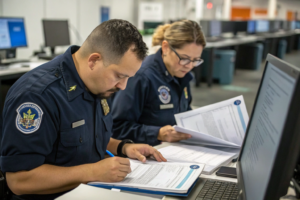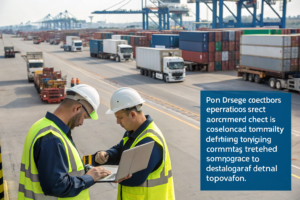International shipping can feel like a rollercoaster of stress. Between endless customs rules, packed carrier schedules, and surprise fees that hit like a punch, even seasoned importers can feel like they’re drowning. One small slip-up can snowball into weeks of delays and a mountain of lost cash.
Freight forwarders take the chaos out of global shipping by owning the paperwork, locking in carrier space, syncing transport modes, and tackling problems before they blow up. They bring order to the madness, giving importers the breathing room to focus on their business instead of chasing down cargo updates.
If you’ve ever thought international shipping was more hassle than it’s worth, a skilled forwarder is the stress-busting partner you need.
How do freight forwarders simplify messy paperwork?
Paperwork is where imports crash and burn. Tariff codes, origin certificates, and clearance forms aren’t just boring—they’re traps waiting to trip you up. Forwarders make sure every box is ticked and every stamp in place.
They draft invoices, packing lists, bills of lading, and clearance forms with surgical precision. By sweating every detail, they keep containers rolling instead of gathering dust at a port.

Why is paperwork such a pain for importers?
Because every country has its own set of hoops to jump through, and one wrong move costs big. U.S. Customs and Border Protection and European Commission Trade point out incomplete paperwork is one of the top culprits for cargo delays.
Can forwarders file everything online?
Yes. Most now run filings through systems like CargoWise and government e-portals, shaving hours off the process and slashing human error.
How do forwarders lock down scarce carrier space?
During peak season, carrier space vanishes like water in the desert. Smaller shippers without clout often get left stranded. Forwarders flip the script with their buying muscle.
They lock down vessel slots, air cargo space, and trucking capacity that solo importers could never score. That means goods keep moving while others are stuck waiting weeks.

How do forwarders score the edge?
They pool freight from a ton of clients, giving carriers steady volume they can’t ignore. Reports from The Journal of Commerce and IATA confirm that this buying power earns forwarders first pick.
Does this really help when shipping lanes are jammed?
Absolutely. Sources like Port Technology International show that forwarders’ connections often decide who sails and who stalls.
How do freight forwarders sync multimodal shipping?
International shipping is rarely a straight shot—it’s a handoff marathon across ships, planes, trains, and trucks. Without someone calling the plays, cargo gets stuck in limbo.
Forwarders choreograph ocean, air, rail, and trucking schedules so shipments glide from one mode to the next without downtime. Their coordination chops save importers from days of dead air at transfer points.
![]()
Why is multimodal coordination such a big deal?
Because the worst delays happen during handoffs. Studies from UNCTAD and World Bank Logistics show sharp planning is what keeps cargo moving fast.
Do forwarders use real-time control tools?
Yes. Platforms like Project44 and Flexport give them a bird’s-eye view across all modes, letting them squash bottlenecks before they turn into disasters.
How do forwarders put out fires before they spread?
Global trade is unpredictable. Storms hit, strikes flare, containers get rolled—it’s chaos waiting to happen. The difference between a nightmare and smooth sailing? Having a forwarder who knows how to fight fires.
Forwarders reroute cargo, renegotiate with carriers, or set up emergency storage before issues spiral out of control. Instead of waiting for problems to explode, they stamp them out early.

What kinds of problems can forwarders fix on the fly?
Everything from missing paperwork to congested ports. References from Freightwaves and Transport Topics show how forwarders act as crisis managers for supply chains.
Does this really take stress off importers?
Yes. Knowing someone’s got eyes on your cargo 24/7 makes the process feel far less like gambling. Articles from InBound Logistics and Supply Chain Digital underline how forwarders’ problem-solving cements trust.
Conclusion
Freight forwarders aren’t just booking agents—they’re stress-busters for global trade. By crushing paperwork headaches, locking in scarce carrier space, syncing multimodal moves, and fighting off problems before they escalate, they turn shipping chaos into a predictable routine. For importers juggling deadlines and customer expectations, a skilled forwarder isn’t just handy—it’s a lifeline.









